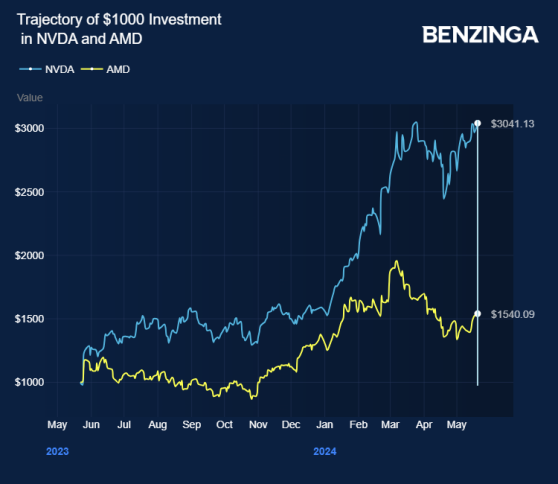Benzinga - by Anusuya Lahiri, Benzinga Editor.
Nvidia Corp’s (NASDAQ:NVDA) rivals and significant clients are supporting an initiative led by OpenAI to develop software that facilitates the switch from Nvidia’s chips for artificial intelligence development.
Despite Nvidia’s near monopoly on chips necessary for large AI systems, competitors like Intel Corp (NASDAQ:INTC), Advanced Micro Devices, Inc (NASDAQ:AMD), and Qualcomm Inc (NASDAQ:QCOM) are targeting Nvidia’s software platform, Cuda, to attract its customers, the Financial Times reports.
Industry experts highlight that Nvidia’s real strength lies in its Cuda software platform, which optimizes chips for accelerated AI applications, not just its powerful processors.
Meta Platforms Inc (NASDAQ:META), Microsoft Corp (NASDAQ:MSFT), and Alphabet Inc (NASDAQ:GOOG) (NASDAQ:GOOGL) Google engineers are contributing to developing Triton, a software introduced by OpenAI in 2021 designed to enhance code efficiency across various AI chips, aiming to diminish Nvidia’s dominance in AI hardware.
Since introducing its Cuda software in 2006, Nvidia has significantly invested in developing a wide array of software tools, enhancing the ease and speed of running AI applications on its GPUs. This has led to a software-first strategy in its business model.
However, the high cost and limited availability of Nvidia’s advanced products, such as the H100 and forthcoming GB200 “super chip,” have compelled major clients such as Microsoft, Amazon, and Meta to explore alternatives or develop their technologies.
The dependence on Nvidia’s Cuda software complicates transitioning to other processors, like AMD’s MI300 or Intel’s Gaudi 3.
Meanwhile, Nvidia analysts expect the chip designer to beat and raise in the April quarter, expecting Blackwell to be completely sold out, at least for a year.
NVDA Price Action: Nvidia shares traded lower by 0.99% at $939.45 at last check on Tuesday.
Disclaimer: This content was partially produced with the help of AI tools and was reviewed and published by Benzinga editors.
Photo via Shutterstock
© 2024 Benzinga.com. Benzinga does not provide investment advice. All rights reserved.
Read the original article on Benzinga
